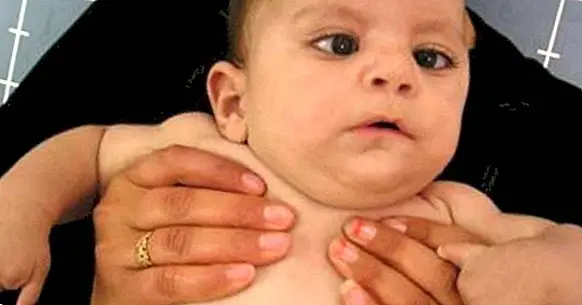Moebius syndrome: causes, symptoms and treatments
Moebius syndrome, also known as Möbius syndrome , is a rare neurological disorder whose symptoms already appear in newborn babies. It is a pathology that affects the movement and control of various muscles of the face and also causes other important problems in other parts of the body.
Below we will see what is known about the causes of Moebius syndrome, what are its main symptoms and what kind of treatments are recommended to treat patients with this neurological disease.
- Maybe you're interested: "The 15 most frequent neurological disorders"
What is Moebius syndrome?
It is known as Moebius syndrome a congenital neurological disease that is considered very rare due to the scarcity of known cases of patients with symptoms that fit the diagnostic criteria.
The main effect of this pathology is the absence or underdevelopment of nerves linked to certain facial muscles, which is usually reflected in partial or total facial paralysis and, in some cases, deformations in various parts of the body.
- You may be interested: "Duchenne muscular dystrophy: what it is, causes and symptoms"
Symptoms of Moebius syndrome
As we have seen, the main symptoms of this pathology have to do with Poor control of the muscles of the face , although they are not the only manifestations of the disease. This is a more detailed explanation of the signs of the pathology:
1. Problems when trying to move facial muscles
The deterioration of the cranial nerves, especially the VI and VII, means that the movement of the eyelids can not be controlled well. that the repertoire of facial expressions be limited . The face seems to have been "frozen".
2. Hypotonia
The problems in the motor nerves make that many muscles degrade by not being used .
3. Failures of ocular coordination
To work well, the eyes need a high degree of coordination in the work of small muscles of the face, so small flaws in these movements are noticeable in this part of the body. Further, the deterioration of the cranial nerve VI can produce strabismus .
4. Difficulty coordinating lips and tongue
Another typical symptom of Moebius syndrome, which also usually causes dysarthria (difficulty in pronunciation and speech in general.
5. Malformations in the feet
Many people with Moebius syndrome they misplace their feet when walking , orienting the plants towards the interior, which ends up generating malformations.
6. Problems of socialization
This consequence derives from the difficulties in the movement of the muscles of the face, something that has a great impact on social life by not using normal facial expressions.
7. Alterations in swallowing
Swallowing costs, because of the problems in the movement of the tongue. Choking and coughing are frequent.
8. Dry mouth and oral diseases
By not closing the mouth well, it dries and the germs proliferate . This, for example, can cause infections, malformations or cavities and other dental and gum problems to appear.
9. Breathing problems
The malformations of the jaw and the inability to close the mouth well cause some complications to appear when breathing, especially during sleep.
Causes of this pathology
It is known that Moebius syndrome especially affects cranial nerves VI and VII , although they can also damage other cranial nerves that leave the brainstem. However, the exact biological mechanism that causes this degradation is not known (in part because it is a rare pathology).
However, there are some theories of what might be happening in the health of patients with this neurological disorder.
For example, although the heritability of this syndrome is low, which means that it usually occurs in babies of fathers and mothers who do not manifest symptoms or with fathers or mothers who express them, the REV3L and PLXND genes could be involved .
It has also been argued that the Moebius syndrome could be caused by problems during intrauterine development associated with environmental or genetic alterations, such as the cessation of blood flow to the brain of the embryo.
Treatments
Currently, there is no known method of intervention that guarantees a definite cure for Moebius syndrome with a good margin of probability. Thus, the treatments used with patients with this pathology are oriented not to cure, but to mitigate the negative impact of the symptoms and aid for socialization and labor insertion.
In this sense, an interdisciplinary work is necessary between different health professionals, such as neuropsychologists, neurologists, speech therapists, pediatricians and clinical and health psychologists, among others. In psychotherapy you can work through cognitive-behavioral therapy to modify limiting beliefs and improve the self-esteem of patients, as well as to train them in social skills, which along with the work of speech therapists will help break the isolation that often suffer this people.
You can also resort to surgery to correct malformations that occur, although always trying correct bad postural habits so that they do not appear more in the future.




















